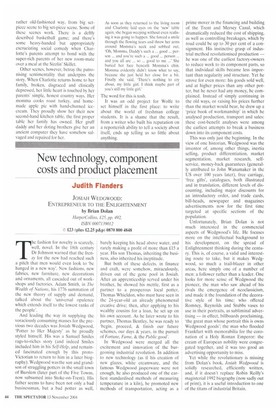New technology, component costs and product placement
Judith Flanders
JOSIAH WEDGWOOD: ENTREPRENEUR TO THE ENLIGHTENMENT by Brian Dolan HamerCollins, £25, pp. 492, ISBN 0007139012 r, 123 (plus £2.25 p&p) 0870 800 4848 The fashion for novelty is scarcely, well, novel. in the 18th century Dr Johnson warned that the frenzy for the new had reached such a pitch that men would even look to 'be hanged in a new way'. New fashions, new fabrics, new furniture, new decorations and ornaments, all cascaded out of workshops and factories. Adam Smith, in The Wealth of Nations, his 1776 summation of the new theory of supply and demand, talked about the 'universal opulence which extends itself to the lowest ranks of the people'.
And leading the way in supplying the voraciously consuming masses for the previous two decades was Josiah Wedgwood, 'Potter to Her Majesty' as he proudly styled himself. His was a Samuel Smiles rags-to-riches story (and indeed Smiles included him in his Self-Help, and remained fascinated enough by this protoVictorian to return to him in a later biography). Wedgwood was the son and grandson of struggling potters in the small town of Burslem (later part of the Five Towns, now subsumed into Stoke-on-Trent). His father seems to have been not only a bad businessman, but a bad potter as well,
barely keeping his head above water, and rarely making a profit of more than £15 a year. His son Thomas, inheriting the business, also inherited his ineptitude.
But both of these defects, in finance and craft, were somehow, miraculously, driven out of the gene pool in Josiah. After an apprenticeship served under his brother, he showed his mettle, first as a partner to a prosperous local potter, Thomas Whieldon, who must have seen in the 24-year-old an already phenomenal creative drive; then, after applying to his wealthy cousins for a loan, he set up on his own account. As he later wrote to his partner, Thomas Bentley, he was ready to 'begin, proceed, & finish our future schemes, our days & years, in the pursuit of Fortune, Fame, & the Public good'.
In Wedgwood were merged all the excitement and innovation of the burgeoning industrial revolution. In addition to new technology (as if his creation of new glazes, white creamware. and the famous Wedgwood jasperware were not enough, he also produced one of the earliest standardised methods of measuring temperature in a kiln), he promoted new methods of transportation, acting as a prime mover in the financing and building of the Trent and Mersey Canal, which dramatically reduced the cost of shipping, as well as controlling breakages, which by road could be up to 30 per cent of a consignment. His instinctive grasp of industrial method revolutionised production — he was one of the earliest factory-owners to reduce work to its component parts, so that individual skills became less important than regularity and structure. Yet he strove for even more: his goods sold well, and at higher prices than any other potter, but he never had any money, he complained. Instead of simply continuing in the old ways, or raising his prices further than the market would bear, he drew up a 'price book of workmanship' in which he analysed production, transport and sales: these cost-benefit analyses were among the earliest attempts to break a business down into its component costs.
This was only just the beginning. In the view of one historian, Wedgwood was the inventor of, among other things, inertia selling, product differentiation, market segmentation, market research, selfservice, money-back guarantees (generally attributed to John Wanamaker in the US over 100 years later), free carriage, 'free gifts', catalogues, both illustrated and in translation, different levels of discounting, including major discounts for an introductory order, and trade cards, bill-heads, newspaper and magazines advertisements now for the first time targeted at specific sections of the population.
Unfortunately, Brian Dolan is not much interested in the commercial aspects of Wedgwood's life. He focuses more on the intellectual background to his development, on the spread of Enlightenment thinking during the century. This is, of course, a valid and interesting route to take, but it makes Wedgwood, so much a trail-blazer in other areas, here simply one of a number of men: a follower rather than a leader. One looks for more sense of Wedgwood the pioneer, the man who saw ahead of his rivals the emergence of neoclassicism, and made it the foundation of the decorative style of his time; who offered Romney, Reynolds and Stubbs vases to use in their portraits, as subliminal advertising — in effect, billboards proclaiming. 'the great man whose portrait this is owns Wedgwood goods'; the man who flooded Frankfurt with memorabilia for the coronation of a Holy Roman Emperor: the cream of European nobility were congregated together, and it was too good an advertising opportunity to miss.
Yet while the revolutionary is missing from Dolan's book, Josiah Wedgwood is solidly researched, efficiently written, and, if it doesn't replace Robin Reilly's magisterial 1992 biography (now sadly out of print), it is a useful introduction to one of the titans of industrial Britain.


























































































 Previous page
Previous page